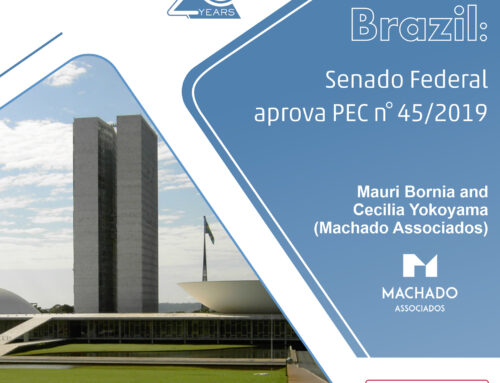Brazil’s STF deems that it is a crime not to pay the ICMS reported by taxpayers
Ricardo Marletti Debatin da Silveira of Machado Associados explores the Supreme Court’s analysis of an appeal in habeas corpus (RHC n. 163.334 / STF), which could lead to wider tax enforcement measures in Brazil.
The ICMS is a state value-added tax levied on the domestic circulation and import of goods, and on the rendering of communication and certain types of transportation services. It is considered the most complex and controversial tax in Brazil as, among other matters, it is regulated and collected by 27
different states. The ICMS is one of the main targets of the tax reform under analysis by the Brazilian Congress, which is expected to be approved in 2020.
As an indirect tax, the ICMS burden is included in the prices of goods and certain services, identified in invoices, and transferred to consumers through the prices.
On December 18 2019, by majority of votes (7 to 3), the Brazilian Federal Supreme Court (STF) decided that in the appeal of habeas corpus RHC n. 163.334 / STF, it was a crime not to pay the ICMS reported by taxpayers to the states tax authorities. The court considered that the ICMS ‘charged from the consumer’
does not belong to the taxpayer, as the tax amount is only temporarily under the taxpayer’s responsibility until its payment to the creditor, the State Treasury.
Following this reasoning, the STF considered that the taxpayer’s conduct is a crime of ‘undue appropriation’ based on Article 2, II, of Law 8,137/90†, which defines the crimes against the Brazilian tax system. If convicted, the taxpayer may be subject to a penalty ranging from six months to two years imprisonment, and to a fine. In general, the penalty may be cancelled if the ICMS is paid by the taxpayer.
Reporting Justice Luis Roberto Barroso stated that it is necessary, however, to prove the taxpayer’s ‘contumacious and willful misconducts’, as the mere default in paying taxes should not be considered as a crime. Therefore, the ‘contumacious and willful misconducts’ are the main elements to be investigated and evidenced on a case by case basis, during a tax investigation or on further proceedings. We should note that both elements are subjective, and that the concept of a contumacious tax debtor is not defined by a federal criminal law.
In this context, this new precedent from the highest Brazilian court is alarming and will bring even more uncertainty to the ICMS taxpayers, who will suffer higher pressure from the states, which generally target the increase of revenues through the collection of taxes.
It is worth mentioning that this case refers to the ICMS due by the taxpayer regarding its own transactions (the so-called ‘own ICMS’), and not to further transactions in the commercial chain, which may be subject to the advance payment of the ICMS (the ICMS Tax Substitution). In other words, the STF now considers that the taxpayer’s failure to pay its own taxes, if certain subjective requirements are met, may typify as ‘undue appropriation’ and, therefore, as a crime.
The fact is that the qualification of the conduct as undue appropriation stated in Article 2, II, of Law 8,137/90, does not apply to this case, but to situations in which the taxes due by third parties in the chain are previously charged or withheld by the taxpayer and not paid to the State Treasury. This could be applied, for instance, to the ICMS Tax Substitution, which is not the case at issue.
Maybe the criminal offense in this case could be qualified in other Articles of Law 8,137/90, but a ‘fraudulent conduct’ would have to exist and be evidenced to be considered as a crime against the tax system. The mere default in paying taxes should not be confused with tax evasion.
This precedent will probably be used as a tool by the tax authorities to force the payment of taxes, as taxpayers will likely try to avoid criminal charges. While, even more serious than that, this reasoning by the STF could be extended to other indirect taxes, the financial burden of which are also transferred to
the consumers (prices). This means extreme legal uncertainty, which should be avoided by the Supreme Court, and not the opposite.
In this scenario, considering that the characterisation of contumacious and willful misconduct will arise from a subjective analysis by the tax authorities and/or the judicial branch, an increase in the number of criminal proceedings related to tax matters may be expected in Brazil.
† Article 2, II, of Law 8,137/90 states that it is crime “II – to not pay, within the legal deadline, the amount of tax or social contribution, discounted or charged, as the person liable to pay such tax to the public treasury;”
This article was first published by International Tax Review in January 2020
(https://www.internationaltaxreview.com/article/b1jzlpgfj9mhmf/brazil39s-stf-deems-that-it-is-a-crime-not-to-pay-the-icmsreported-by-taxpayers)





